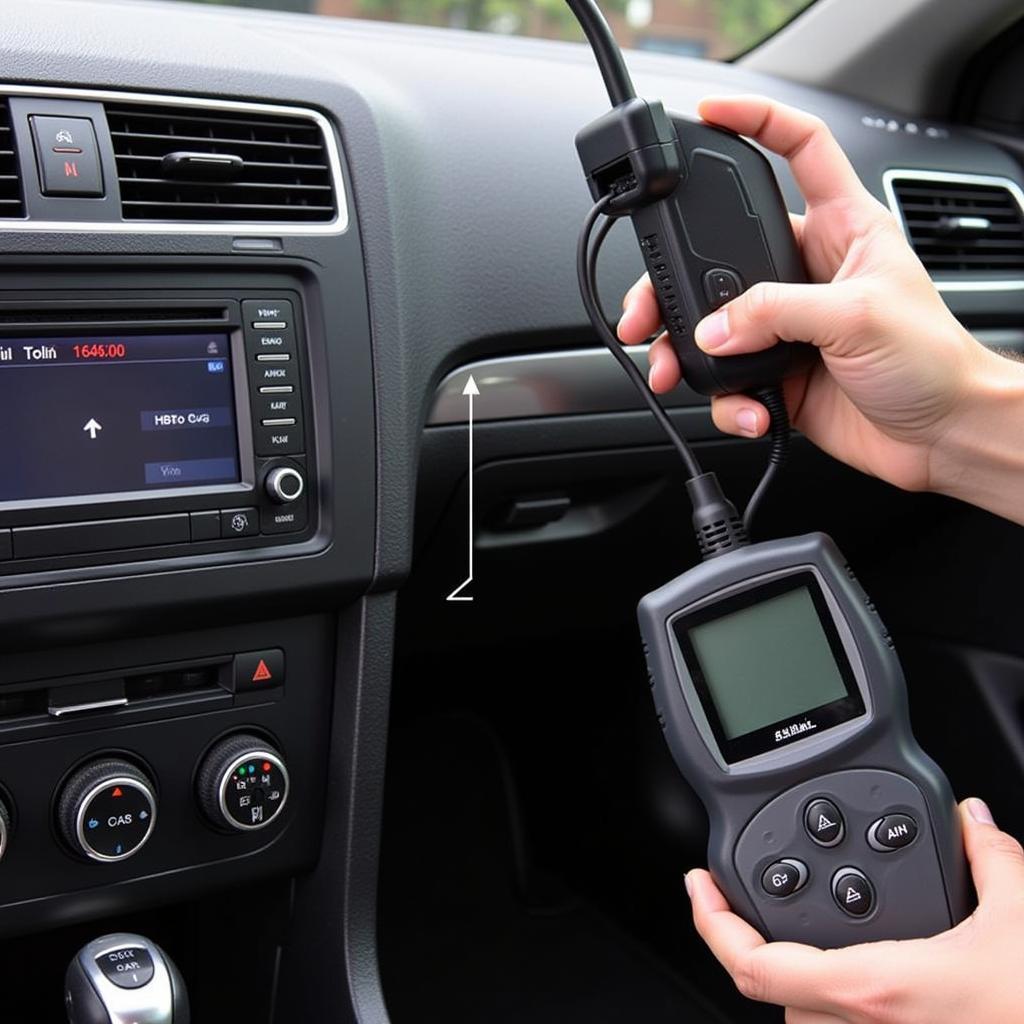Your cart is currently empty!

Decoding the Engine Code for Your VW CC 2014
Understanding your 2014 VW CC’s engine code is crucial for effective troubleshooting and repair. Whether you’re a DIY enthusiast or a seasoned mechanic, this guide will provide valuable insights into diagnosing and resolving engine-related issues, specifically focusing on the engine code for vw cc 2014. Knowing how to interpret these codes can save you time and money in the long run.
If you’re experiencing issues with your VW TDI and have encountered the P2015 code, you can find more information on our dedicated page: vw tdi p2015 code.
What Does an Engine Code Mean for a 2014 VW CC?
Engine codes, also known as Diagnostic Trouble Codes (DTCs), are alphanumeric codes that your car’s onboard computer generates when it detects a malfunction within the engine or related systems. These codes are like clues left by your car, pointing towards the potential source of the problem. Deciphering these codes is the first step towards accurately diagnosing and fixing any underlying issues. For a 2014 VW CC, these codes can range from simple sensor malfunctions to more complex issues within the engine’s control system.
How to Retrieve Engine Codes on a VW CC 2014
Retrieving engine codes on your VW CC 2014 typically requires an OBD-II scanner. This handy device plugs into your car’s OBD-II port, usually located under the dashboard on the driver’s side. Once connected, the scanner can read the stored DTCs, providing you with the necessary information to begin your diagnostic process. Some advanced scanners can even provide live data streams, allowing you to monitor various engine parameters in real-time.
 Connecting an OBD-II Scanner to a 2014 VW CC
Connecting an OBD-II Scanner to a 2014 VW CC
Common Engine Codes for a 2014 VW CC and Their Meanings
While numerous engine codes can appear in a 2014 VW CC, some are more common than others. Let’s explore a few examples:
- P0171: This code usually indicates a lean air/fuel mixture in bank 1, meaning there’s too much air compared to fuel. This could be caused by a faulty oxygen sensor, a vacuum leak, or a problem with the fuel injectors.
- P0420: This code suggests a problem with the catalytic converter system efficiency below threshold (Bank 1). This often points to a failing catalytic converter, but it could also be due to a faulty oxygen sensor.
- P0300: This is a random/multiple cylinder misfire detected. This could indicate a problem with spark plugs, ignition coils, fuel injectors, or even a more serious internal engine issue.
Understanding what each code signifies is vital for effective troubleshooting.
Are you having trouble with a P0016 code on your VW Passat? Check out this resource: p0016 code vw passat.
Troubleshooting Engine Codes: A Step-by-Step Guide
- Retrieve the Code: Use an OBD-II scanner to read the specific engine code.
- Research the Code: Understand what the code means and the potential causes.
- Visual Inspection: Check for any obvious issues like loose connections, damaged wires, or leaks.
- Test Related Components: Based on the code, test the related components (e.g., oxygen sensors, MAF sensor) using a multimeter or other diagnostic tools.
- Consult a Professional (If Needed): If you’re unable to diagnose the problem, consult a qualified mechanic.
“Don’t jump to conclusions based on the engine code alone,” advises Alex Thompson, a senior automotive technician with over 20 years of experience. “Thorough diagnosis is key to identifying the root cause.”
If you’re dealing with a specific code like 01325 on your 2014 VW Jetta, we have a dedicated resource for that: 2014 vw jetta code 01325.
Preventative Maintenance for your 2014 VW CC
Regular maintenance can prevent many engine-related problems. This includes:
- Regular Oil Changes: Using the correct oil type and changing it at the recommended intervals.
- Spark Plug Replacement: Replacing spark plugs according to the manufacturer’s schedule.
- Fuel System Cleaning: Periodically cleaning the fuel injectors and fuel system.
- Air Filter Replacement: Keeping the air filter clean ensures proper airflow to the engine.
“Preventative maintenance is like investing in your car’s health,” says Maria Sanchez, a certified mechanic and automotive instructor. “It’s always cheaper to prevent a problem than to fix it later.”
Conclusion: Mastering the Engine Code for VW CC 2014
Understanding your 2014 VW CC’s engine code is a powerful tool for any car owner or mechanic. By using the information and guidance provided in this article, you can confidently diagnose and address engine-related issues, ultimately saving time and money. Remember that proper diagnosis and preventative maintenance are crucial for keeping your VW CC running smoothly. For personalized assistance and professional diagnostics, connect with us at VCDStool at +1 (641) 206-8880 and our email address: vcdstool@gmail.com or visit our office at 6719 W 70th Ave, Arvada, CO 80003, USA.
If you encounter a low voltage code on your VW Jetta, you might find this helpful: low voltage code vw jetta. Also, check out information about the VW Jetta 2.0 engine code: vw jetta 2.0 engine code.
by
Tags:
Leave a Reply